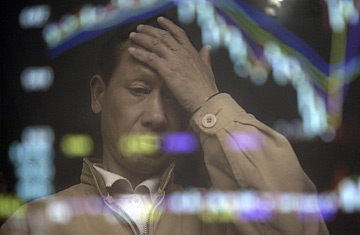
A shareholder reacts to changes in the Chinese stock market, February 2007.
That's the question policymakers in Beijing face in the wake of Thursday's report that China's economy had grown at 11.1% during the first quarter of 2007. As is often the case with the Chinese economy, that number took a lot of people by surprise — it was much faster than expected. China's real economic growth has averaged more than 10% per quarter for four years now, and Li Xiaochao, an official at Beijing's National Bureau of Statistics, on Thursday addressed the creeping fears that the Chinese economy might be overheating: "One very important lesson we have learned is not to make excessively large policy adjustments, but rather to take small, micro steps, and fine-tune them. The aim is to avoid a hard landing of the economy," Li said.
So, why is it important that China avoid a "hard landing, and how serious is the risk that it might not? The answer to the first question is easy: the growth of the global economy, outside of the United States, has rarely been stronger than it is now, and China is a big part of that story. It's true that China is racking up huge trade . surpluses with the United States (and Europe), and will continue to do so far into the future. But many companies in many industries have hitched themselves to China's extraordinary growth, and have made bets on the future that assume steady, rapid and sustained growth there. Forget about the obvious beneficiaries of the China boom, such as producers of oil and commodities. China's growth is a huge boost to American companies like Procter & Gamble, Caterpillar Tractor and chip-maker Texas Instruments. The beneficiaries also include service companies ranging from law firms and investment banks to environmental consultants.
In late February, the two major stock markets in China dropped sharply, and that helped trigger a brief global sell-off. Investors panicked, fearing that the Chinese economy was somehow falling off a cliff. As Thursday's growth number shows, that wasn't so. Not even close. Now, however, global markets are focused on a better question: is China's growth so strong that it is going to fuel inflation, followed by sharply higher interest rates, and, conceivably, problems in a deeply dysfunctional domestic banking system? And, will there be a hard landing, meaning a sharp reduction in growth from around 11% to anywhere between 6% and 8%?
The reason the Shanghai stock market cratered Thursday is that this has happened before: in the early '90s, authorities in Beijing let inflation get out of hand, and a hard landing ensued. In the first quarter of this year, inflation at 2.7% was at its highest level in two years, and money supply in China has been, in the view of some economists, excessive for quite a while now. Is fine-tuning really an option? Or is this freight train now rolling with such momentum that a messy derailment is likely, if not inevitable? Jun Ma, the chief economist at Deutsche Bank Securities in Hong Kong, has been one of the more accurate forecasters of the Chinese economy in recent years. He still believes the inflation threat is manageable, and that the authorities in Beijing can avoid a train wreck even while bumping up rates and trying to curb bank lending to, among others, the still red hot real estate sector.
The optimistic view is still probably the consensus — but it's a shakier consensus than it was just one day ago. A critical question is whether the central government can actually rein in the parts of the economy that it believes are in bubble territory without causing broader economic damage. Real estate is a key — an industry in China that has deep political ties, particularly at the local and provincial level. For several years now, a lot of people have been saying that property is a bubble; that a crackdown is coming; and that widespread economic pain would ensue when it did. It it hasn't' happened yet, but if it does, you'll know it. In the first part of the '90s, when China slowed sharply, few people in the outside world cared much. That is not true now. A hard landing this time will be hard on everyone.
